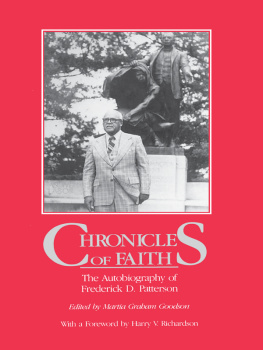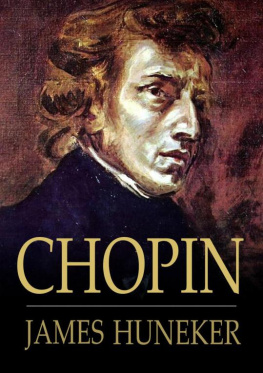coll. - Chronicles Of Faith
Here you can read online coll. - Chronicles Of Faith full text of the book (entire story) in english for free. Download pdf and epub, get meaning, cover and reviews about this ebook. year: 0, genre: Non-fiction. Description of the work, (preface) as well as reviews are available. Best literature library LitArk.com created for fans of good reading and offers a wide selection of genres:
Romance novel
Science fiction
Adventure
Detective
Science
History
Home and family
Prose
Art
Politics
Computer
Non-fiction
Religion
Business
Children
Humor
Choose a favorite category and find really read worthwhile books. Enjoy immersion in the world of imagination, feel the emotions of the characters or learn something new for yourself, make an fascinating discovery.
- Book:Chronicles Of Faith
- Author:
- Genre:
- Year:0
- Rating:3 / 5
- Favourites:Add to favourites
- Your mark:
- 60
- 1
- 2
- 3
- 4
- 5
Chronicles Of Faith: summary, description and annotation
We offer to read an annotation, description, summary or preface (depends on what the author of the book "Chronicles Of Faith" wrote himself). If you haven't found the necessary information about the book — write in the comments, we will try to find it.
Chronicles Of Faith — read online for free the complete book (whole text) full work
Below is the text of the book, divided by pages. System saving the place of the last page read, allows you to conveniently read the book "Chronicles Of Faith" online for free, without having to search again every time where you left off. Put a bookmark, and you can go to the page where you finished reading at any time.
Font size:
Interval:
Bookmark:

Copyright 1991 by
The University of Alabama Press
Tuscaloosa, Alabama 354870380
All rights reserved
Manufactured in the United States of America
The paper on which this book is printed meets the minimum requirements of American National Standard for Information Science-Permanence of Paper for Printed Library Materials, ANSI A39.48-1984.
Library of Congress Cataloging-in-Publication Data
Patterson, Frederick D. (Frederick Douglass), 19011988.
Chronicles of faith: the autobiography of Frederick D. Patterson
/ edited by Martia Graham Goodson : with a foreword by Harry
V. Richardson.
p. cm.
Bibliography: p.
Includes index.
ISBN 0-8173-0459-2
1. Patterson, Frederick D. (Frederick Douglass), 19011988. 2. Tuskegee InstitutePresidentsBiography. 3. United Negro College FundHistory. I. Goodson, Martia Graham. II. Title. LC2851 1935. T817P38 1991
378.111dc20
[B]
89-4894
CIP
British Library Cataloguing-in-Publication Data available
0-8173-1196-3 (pbk: alk. paper)
ISBN-13: 978-0-8173-8283-4 (electronic)
To my wife, Catherine, a helpmate and counselor over a period of fifty years. As a devoted mother, she provided our son with love and care during the many absences required of me by Tuskegee Institute (now Tuskegee University) and the Phelps Stokes Fund.
and
To my sister, Wilhelmina B. Patterson, who as the oldest of six children, when we lost our parents before my second birthday, became my surrogate mother. At whatever the cost, Wilhelmina provided for my education and kept before me goals of achievement. For this my gratitude is without end.
This book is the story of a man and his indomitable faith in himself, in the causes he espoused, and in the essential goodness of human nature. According to this man, if a social need exists and ways of meeting it are shown, people of goodwill will respond. Because in every instance his faith was vindicated, the present book is a chronicle of faith triumphant.
Frederick Douglass Patterson had the ability to see social needs clearly and realistically, as calls for action, not simply as subjects for emotional oratory. Having identified a social need, he was not content to rest until something corrective had been done.
But corrective work is hard. It requires endless persistence in making plans, in forming organizations, in finding competent personnel, in fund raising, in maintaining morale both in givers and receivers, and in seeing that everything is done faithfully and efficiently. Patterson had the capacity for all of these tremendous labors and has extended them even into his later years, not for profit, but for human betterment and national welfare.
His founding and development of the United Negro College Fund, which I regard as his magnum opus, illustrate the point, but he had other achievements, too, especially his introduction of military aviation at Tuskegee, an innovation which gave black people access to this field for the first time. Later, in wartime when the government took over this effort, black young men, like their fathers before them, came forward to offer their lives in defense of America, not only on land and sea, but in the sky as well. No less impressive an accomplishment was the establishment of theSchool of Veterinary Medicine at Tuskegee. The university now graduates more black veterinarians than all of the other eighteen American veterinary schools combined.
Then, too, in the pages of this book the reader will see American democracy at its best, as hands reach out, sometimes in sacrificial ways, to help a person striving to address a social need. Finally, this book may suggest ways of helping our world in these troubled, anxious days. For all of these reasons it will be read with profit and inspiration.
Harry V. Richardson
Chronicles of Faith emerges from a series of recorded interviews I conducted with Frederick Patterson in 1980 and again in 198687. The original interviews formed part of an oral history of the United Negro College Fund collected by the Oral History Research Office at Columbia University. The later series was conducted when Dr. Patterson decided to record his reminiscences more completely on paper.
Patterson was born before the twentieth century was two years old. Chronicles of Faith is therefore not only his life story but a story of the twentieth century as well and embodies the perspective of a participant in important national and international events of the period. It is, primarily, a history of institutions: Tuskegee Institute, the United Negro College Fund, the Phelps Stokes Fund, and the Robert R. Moton Memorial Institute.
A reading of Chronicles of Faith not only reveals the perspicacity which Patterson employed in the interest of African and African-American youth throughout his life but also illuminates the characters of other people active in the first half of this century. Patterson helps us remember some names that may be fading from historical memory.
This retrospective view of Pattersons life carries the reader to a variety of places: places as far apart economically as the White House (in the city of Pattersons birth) and the wooden shacks of sharecroppers and tenants on plantations in rural Alabama (at the time when Patterson was a college president); places as far apart geographically as Prairie View, Texas, and Kakata, Liberia; and places generally unheard of, such as Chehaw, Alabama, and Capahosic, Virginia. Pattersons offices in New York, in university laboratories,and in institutions of technical education in colonial East and West Africa are stops on the journey recalled here.
The significance of this collection of oral reminiscences lies in the spectrum of activities in African-American and African life with which Patterson has been associated. His story fleshes out a picture of the social, economic, and educational scene and therefore provides the political backdrop for African-Americans in the American South from the turn of the century to the present. He does the same thing, though to a lesser extent, for Africans in the final days of the British Empire. Chronicles provides evidence of historically consistent supportboth financial and spiritualin the African-American community for education and especially for its traditional institutions of higher education. Pattersons creation, the United Negro College Fund, was the first ongoing cooperative fund-raising organization for higher education in America.
Pattersons life serves as a reminder that the institutions with which he was affiliated reflect, in their present form, many years of thought, study, discussion, and struggle. Their maintenance and advancement require more of the same, with an extra measure of vigilance. Within Pattersons memoirs, we find no contradicition of Du Boiss assertion that the problem of the twentieth century is the problem of the color line. But clearly, Pattersons recognition of the absurdity of that line did not deter him from using it as a whip to promote opportunities both for African and African-American people and for the American nation. His work challenges us to do no less.
My thanks to many friends and associates who have encouraged me to write this book. They felt that I should describe my part in events at Tuskegee University, the Phelps Stokes Fund, the United Negro College Fund, and the Robert A. Moton Memorial Institute as a personal experience.
I feel that the events detailed herein should be recorded. They are historic and should be recognized in the context of the progress made by this country and by its black citizenry. In this effort, I wish to thank the many persons who are related to each event, to the extent that memory permits.
Font size:
Interval:
Bookmark:
Similar books «Chronicles Of Faith»
Look at similar books to Chronicles Of Faith. We have selected literature similar in name and meaning in the hope of providing readers with more options to find new, interesting, not yet read works.
Discussion, reviews of the book Chronicles Of Faith and just readers' own opinions. Leave your comments, write what you think about the work, its meaning or the main characters. Specify what exactly you liked and what you didn't like, and why you think so.



















